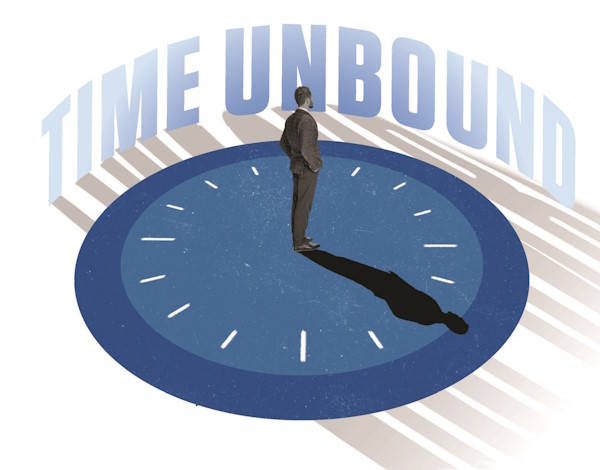Time Unbound: Managing Time Blindness at Work
Attention Magazine February 2024
Time agnosia, commonly known as time blindness, is the consistent difficulty with “perceiving time (estimating how much time has passed or how much time is left before an upcoming event), time sequencing (correctly recounting the order in which events occurred), and time reproduction (repeating a task for the same amount of time that it occurred previously” (Green, 2023). It is a sensory difference, particularly in individuals who are neurodivergent. Some researchers, such as Radek Ptacek and his colleagues, suggest that the difficulty with the perception of time may be a possible diagnostic characteristic for ADHD.
Time blindness can have an impact on your ability to complete your activities of daily living, including work. Time blindness can affect your ability to show up to work or appointments on time, hand in assignments or projects on deadline, pay bills on time, remember to eat, fully complete tasks, stick to routines and schedules, and remember when an event last happened. This can lead to strained relationships, disciplinary action, cause for dismissal, burnout, stress, shame, and guilt.

It may also cost you financially, because you must pay for mistakes such as late fees, which is known as the ADHD tax (Webster, 2023). Other people, including employers, can judge someone’s time blindness difficulties and label them as “disrespectful,” “irresponsible,” “uncaring,” “rude,” “immature,” and make other negative judgments. However, time blindness is something that can be appropriately supported, managed, and accepted by everyone involved. This article will discuss how time is contextual, how time blindness can be viewed from a neurodiversity-affirming perspective, time blindness at work, and strategies to help minimize the impacts of time blindness, such as using strategies and accommodations.
Time is contextual: a neurodiversity-affirming perspective
“Time is money.” Have you heard of this popular phrase before? It is a proverb that highlights the concept that time is a valuable resource, and its efficient use is comparable to earning money. The phrase suggests that time, like money, should be managed wisely and not wasted, because the opportunity cost of time misspent could be significant. It is an idea that serves as a reminder of the economic value of time and the importance of managing it judiciously for personal and financial success. In this context, it means that time is a societal value under a capitalist system. In other words, when time is not managed appropriately, it is seen as “wasted” and that it was the person’s choice to waste it.
Unfortunately, adults with ADHD may internalize this societal value and associate their self-worth with how they spend and manage their time. When someone with ADHD has time blindness and struggles with time, they may start to internalize that they are flawed and defective. They may compare themselves to neurotypical people and when they cannot meet these expectations, they may experience shame.
By understanding that we operate within a capitalist system, we can unpack the neurotypical and capitalist expectations around time: strict adherence to schedules, efficient time management, the expectation that everyone should be able to manage their time wisely, completing tasks within designated time frames, punctuality, time-based performance productivity metrics, and emphasis on deadlines. Thus, time is a social and contextual construct. It is something that we as a society have created to implement structure, a unit of measurement, and a way to measure productivity and worth. Therefore, if time is a social construct with meaning, we can view time and assign meaning to it differently depending on the context.
 In a neurodiversity-affirming paradigm, time blindness is something that should be seen as something that requires support and be accepted and be valued without being seen as a defect or disorder and be accommodated if applicable and be seen as a strength. A neurodiversity approach understands that disability is the interaction of person’s characteristics and their environments and that it can be addressed through environmental changes and learning adaptive skills (Dwyer, 2022). The primary goal of neurodiversity-affirming perspectives is to value and accept ADHD and other neurological differences as part of human diversity, and not something that needs to be “cured.” It does not mean that time blindness cannot cause problems and be a disability, but rather it’s simply a natural neurological trait that may require support.
In a neurodiversity-affirming paradigm, time blindness is something that should be seen as something that requires support and be accepted and be valued without being seen as a defect or disorder and be accommodated if applicable and be seen as a strength. A neurodiversity approach understands that disability is the interaction of person’s characteristics and their environments and that it can be addressed through environmental changes and learning adaptive skills (Dwyer, 2022). The primary goal of neurodiversity-affirming perspectives is to value and accept ADHD and other neurological differences as part of human diversity, and not something that needs to be “cured.” It does not mean that time blindness cannot cause problems and be a disability, but rather it’s simply a natural neurological trait that may require support.
In some cultures, there is less emphasis on punctuality and time management. Some cultures do not emphasize punctuality. In other words, it is “normal” and common to be late for an event. For example, “island time” is a colloquial expression that refers to a more relaxed and unhurried approach to time, often associated with the laid-back lifestyle of islands and coastal regions. The concept suggests a slower pace of life, where schedules are more flexible, and people prioritize enjoying the present moment over strict adherence to punctuality and deadlines. In these cultures, time blindness may not be seen as a “disorder,” but rather as a “norm” and a non-problematic behavior. Thus, how we judge and view time blindness is culturally and contextually dependent!
The strengths of time blindness can be the ability to hyperfocus, be present in the moment, adapt quickly to changing environments, learn quickly, and problem solve. Hyperfocusing is a cognitive state associated with intense concentration and absorption in a particular task or activity (Ashinoff & Abu-Akel, 2019). During hyperfocusing, individuals may become so absorbed in the activity that they may lose track of time, ignore external distractions, and display an exceptional level of productivity and attention to detail. Hyperfocusing can be helpful as a surgeon for example. A surgeon can perform twelve hours of surgery and yet feel that only an hour has passed.
Adults with ADHD can be present in the moment and have high energy. This strength can be an advantageous attribute for occupations such as being an entertainer, a community outreach coordinator, or dance instructor. Adults with ADHD often leave things to the last minute, so they have learned skills in adapting to a changing environment and problem solve on the spot in urgent situations. They can learn quickly and absorb a whole course in one night. The ability to hyperfocus and learn something of interest can make them experts in a variety of subjects and gain broad adaptable skills. These skills can be helpful for occupations such as first responder, stock market broker, entrepreneur, emergency management, and freelance journalist.
The Four As Framework for time management at work
Managing time blindness at work can be difficult. You might avoid completing boring tasks like emails, miss deadlines for projects, double book meetings, leave tasks until the last minute and rushing, sign up for too many projects, produce inconsistent work quality, arrive late to work, and have difficulty balancing work and your personal life. This can lead to poor performance reviews, costly mistakes, disciplinary action, career progression challenges, being fired, job hopping, and unemployment.
However, there are strategies, environmental changes, and accommodations that can help mitigate the impact of time blindness in your job. I recommend the Four As Framework as outlined in Table 1.
Table 1: Adapt, Adjust, Ask, or Accommodate
| APPROACH | DEFINITION | EXAMPLE TIME-RELATED STRATEGIES |
| Adapt | Adapting means to learn skills, strategies, and tools to help you perform your job demands. | ● Timers and alarms (visual timers such as the Time Timer) ● Visual schedules like calendars, planners, or apps ● Time blocking in a schedule ● Using the Pomodoro Technique ● Doubling or tripling your time estimation ● Adding in “buffer time” to tasks or breaks ● Breaking larger tasks into smaller tasks to reduce overwhelm ● Body doubling ● Prioritization matrices ● Recording how long typical tasks might take you ● Minimizing distractions ● Developing routines ● Assigning due dates to tasks ● Scheduling alerts for tasks and meetings ● Implementing boundaries ● Delegating tasks ● Preparing for the everything you need the night before work ● Using a checklist by the door ● Listening to music in the morning |
| Adjust | Adjusting involves assessing your job demands and environment to identify potential changes in the job’s structure or scope. The goal is to better align it with your strengths and minimize weaknesses. | ● Changing your shifts (for example, working the night shift if you’re more alert at night) ● Changing how meetings are scheduled (breaks in between, shorter duration) ● Changing how your productivity is measured (results-based rather than time-based) ● Changing the scope of your job (focusing on solving problems vs. completing administrative tasks) ● Changing the roles and responsibilities amongst your team ● Changing your work environment (working at home vs. in the office) ● Changing your routines or how your day is structured |
| Ask | Asking means having a conversation and negotiating with your employer for supports that would help you, without the need for formal legal documentation or disclosure of your disability. Neurotypical people ask for these changes too. | ● Ask for flexible work hours ● Ask to have frequent check-ins with your supervisor ● Ask for a quiet workspace ● Ask for additional support ● Ask to reassign work duties amongst the work team ● Ask for a more realistic workload ● Ask for job coaching ● Ask to work from home ● Ask for more or less structure ● Ask for extended time on certain projects ● Ask to have due dates ● Ask for a mentor ● Ask to discuss expectations of the job ● Ask for assistance with prioritization ● Ask for a strengths assessment |
| Accommodate | Accommodation means discussing with a healthcare provider what supports are needed for you to perform at your job, and submitting these accommodations to your employer. It is a legal document that requires a response. The above strategies may be requested as an accommodation. However, not all accommodations may be granted. It is balancing act between meeting the worker’s needs and the employer’s needs without undue hardship. If you feel like you may have been discriminated against, or that your employer did not act in good faith, then you may want to consider contacting an employment and/or human rights lawyer. | |
Remember that ADHD is a protected disability under legislation in the United States and Canada. Employers must accommodate people with disabilities without causing undue hardship, but please be careful when thinking about disclosing your disability. You want to consider how safe it is in the workplace and what the attitudes of your employers and coworkers toward people with disabilities. You do not have to disclose your personal health information to seek accommodations.
Affirming neurodiversity and knowing when to change jobs
Have you tried all the above and your situation still does not improve? You might want to reflect on whether your current job caters toward your strengths and has enough resources to manage your challenges. If you are having to use numerous skills (hello ADHD burnout!) to manage your ADHD difficulties, enduring a lack of interest or stimulation, experiencing a poor fit with work, sensing a lack of cultural inclusivity, feeling constant stress or anxiety, suffering from workplace bullying, continuously performing poorly, or not being accommodated, then you may want to look for something different. Finding the right work environment is important!
Time blindness can have a great impact on the daily life of adults with ADHD, particularly their employment. By understanding time as a social construct, shaped by cultural and social expectations, a neurodiversity-affirming perspective recognizes time blindness as a trait requiring skills, support, and accommodation. The Four As framework—Adapt, Adjust, Ask, and Accommodate—provides practical strategies for managing time blindness at work through skill development, job adjustments, assertive communication, and accommodation.
If these support strategies are not effective, then consider exploring new opportunities that fit with your strengths. If you are feeling overwhelmed or lost with managing your time at work, I encourage you to reach out to an occupational therapist or other healthcare provider who understands ADHD at work to help guide you.


 Adam Ly, MScOT, has been practicing in London, Ontario, Canada, as a registered occupational therapist since 2016. He completed his Bachelor of Health Science and Master of Science in Occupational Therapy at Western University. He works at an outpatient clinic assessing and treating clients from car accidents, workplace injuries, longterm disability, and privately paying clients, particularly in a return-to-work context. He teaches workshops through the Canadian Association of Occupational Therapists in cognitive rehabilitation, as well as neurodiversity-affirming assessment and support strategies for adults with ADHD.
Adam Ly, MScOT, has been practicing in London, Ontario, Canada, as a registered occupational therapist since 2016. He completed his Bachelor of Health Science and Master of Science in Occupational Therapy at Western University. He works at an outpatient clinic assessing and treating clients from car accidents, workplace injuries, longterm disability, and privately paying clients, particularly in a return-to-work context. He teaches workshops through the Canadian Association of Occupational Therapists in cognitive rehabilitation, as well as neurodiversity-affirming assessment and support strategies for adults with ADHD.